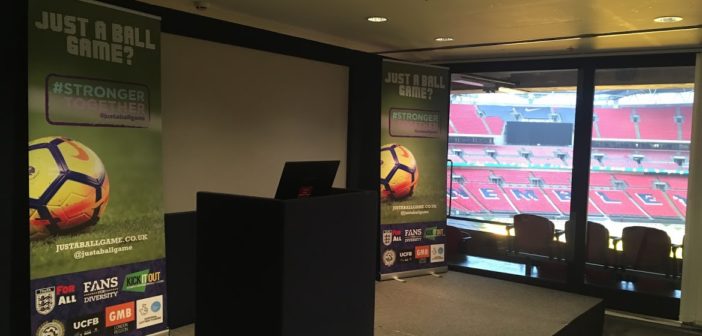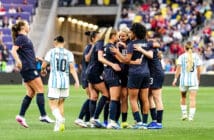Wembley Stadium is no stranger to history making moments. You are reminded of them as you walk the corridors and pass pictures of famous days gone by. Wigan hoisting the FA Cup after beating Manchester City, the NFL International series, Madonna and Prince in concert and countless more lead you on a trip down memory lane.
On February 5, it featured in another historical moment as the first ever Just A Ball Game? conference was held at the home of English football.
Founded by Lindsay England and hosted by the FA, the #StrongerTogether seminar was part of LGBT History Month and had some notable attendees at the event including former Women’s Football Association chairperson Patricia Gregory, who organised the first ever meeting of the organisation in 1969, and held several posts inside the WFA between 1969 and 1983, and former Everton and Welsh international goalkeeper Neville Southall MBE.
England spoke of her delight on the day and how far Just A Ball Game? had come.
Speaking exclusively to Prost International the founder said:
“Who’d have thought this eight years ago? I actually started Just A Ball Game? as a blog, believe it or not, before it was a campaign organisation and it actually went into a regular LGBT plus magazine in the North West.
“At the time it was called Roberto Carlos’ Thighs. I knew I had to change it to be taken seriously. But the content that I was putting in was going down well.”
The eight years leading up to the historic day in early February have been a rollercoaster, but Lindsay feels the organisation will go from strength to strength. When quizzed about where Just A Ball Game? could be in eight years’ time she said:
“Maybe this can be my office.” she said half-jokingly, gesturing around the now darkened Wembley Stadium.
“We’ll be working alongside FIFA and the IOC (International Olympic Committee) and UEFA as they’re starting to take LGBT plus inclusion seriously within football and other sports as well. And also they’re really, seriously taking that zero tolerance towards any discrimination.”
There was a slight sense of fantasy in the air as Lindsay rattled off working alongside some of the most powerful organisations in sport, yet the slight tongue-in-cheek nature of the answer was very serious when you looked past how the JBG? founder delivered it.
Her tone became more serious.
“I touched on it earlier today. It’s okay doing what you think is the right thing, but is it actually the right thing? And if you’re a huge company, a corporate organisation, whatever you’re putting out there, you’re denying services to people if you’re not being inclusive of them, whether you mean to or not.”

Host Lindsay England
Photo: justaballgame?
The seminar featured speakers with brave and inspirational stories of those who have struggled to overcome certain challenges due to the environment that society created for them.
This ranged from Skye Stewart, a transgender lady and Chair at Black Country Fusion FC speaking about the abuse she had suffered from supporters to Richard Dunbar, a member of Bradford City’s LGBT+ fan and ally group, outlining the fantastic work he and others are doing at Bradford City.
Lindsay highlighted how easy it can be for mistakes to be made when trying to implement change and how the LGBT community, and other communities who suffer from similar problems, can be left feeling alienated.
“Anybody can get things wrong. Anybody can make mistakes,” she said, “I’ll be the first to put my hand up. I would hope because I’m only human and I make mistakes.
“But if you’re going to have a zero tolerance right throughout your organisation you have to stand up to that and you have to make sure there is a zero tolerance and at the moment, sadly, there’s not.”
The seminar highlighted several frustrations the LGBT and minority communities had with several organisations and institutions paying ‘lip service’ to the issues of inequality and lack of opportunities for members of the communities.
When speaking with Prost, Lindsay came down hard on organisations being more style than substance. She said:
“While you’re raising awareness and you’re getting things out there and getting people to engage with you and you’re being visible that way. You can do that, but you need to challenge things behind that, and you need to put into practise, behind that, the right sort of education.
“Adam [McCabe] talked earlier on about the pride days and night in the US. They have been successful for a number of years. But behind that you have to have some substances and at the moment, outside of the grassroots work that we’re doing, there isn’t much.
“And we can only attain that when we have little bits of funding from time to time. There needs to be sustainable action behind that, somebody has to put some proper funding behind everything and make sure that the training is running right throughout organisations from top down, from bottom up.”
Adam McCabe, a gay semi-professional footballer for Georgia Revolution in the minor leagues in the USA (and Prost Amerika columnist), spoke on one of the panels organised on the day next to Southall, Vivienne Aiyela, the first ever black female Non Executive Director of Football, and Amrit Bains, who is part of the FA National Youth Council as a regional engagement officer and also a Sikh.

Presenter and diversity campaigner Natasha Henry, the FA’s Vivienne Aiyela, Prost columnist Adam McCabe, Neville Southall and Amrit Bains on a panel at Wembley
Photo: justaballgame?
McCabe echoed Lindsay’s thoughts on the importance of the day. Speaking to Prost International he said:
“I thought there were some really important people here.
“I think that it’s really important for us to get together and discuss what’s happening in our communities and try to think in progressive ways in how we can better football and society.”
During his trip to the UK, Adam spent time with Charlton Athletic who he praised for having a huge impact on their community through inclusion.
“Charlton really pushes diversity and inclusion and they are, for me, a great example of a club that has gone out into the community and made it their focus to get us all to accept other minorities.
“It was incredible. They have a deaf team, a women’s team and an LGBTQ team, the first that is really partnered with their club.
Their LGBTQ team has a full kit and trains at the club and uses Charlton’s facilities. They host an annual tournament where the LGBTQ team plays journalists and the local semi-pro team and I think that’s a great way to bring people together.”
Charlton’s success has prompted other clubs to move in a similar direction with Norwich City and Bristol City adopting a similar initiative as the Addicks and Adam can’t speak highly enough of the impact.
“I think it’s incredible that people at Charlton know they have an LGBT team, they know that people who are gay can play soccer, they enjoy soccer and they’re the same. They just love someone different at the end of the day.”
While high praise was in order throughout the day, Adam echoed what Lindsay had said earlier in the day – that some of the measures being taken are not enough on their own.
“We had a comment today about if Rainbow Laces is enough – to me it’s not,” he said
“It’s a great visual, but I think as Neville pointed out they’re not forcing anybody to do it. So a footballer can say they don’t want to wear them.
“I would love to see a pride game, a pride night here in England. We do it in MLS and it’s pretty good. I just think slowly implementing it and getting into people’s faces where it just becomes ‘normal’. I just want to get to the day were it’s not a gay footballer, but it’s just a footballer who happens to be gay.”
Adam is also a member of the media, in fact he is a columnist for Prost as The Gay Footballer. But Adam also wants to see change in that industry, too. Highlighted by Southall when asked if the media does play a role in the marginalisation of certain communities and minorities, the former Wales shot-stopper pointed out the disconnect and lack of trust many may have with certain media institutions.
McCabe started a podcast to help raise more awareness within the media of LGBT inclusion. He added:
“My podcast is highlighting the LGBT community who work in football and allies who either work in football or who support something that is LGBTQ. There are players out there who are gay, there are people who work in communications department and people who work at the FA who are gay.
“There are many people who are gay and work in football and I wanted to shine a light on that. Whether it be a referee, player, former player – the goal of the podcast is to shine a light on it and that you can work in football and be LGBTQ.”
When Raheem Sterling took to social media on December 9 to highlight how media coverage of black athletes can fuel racism, the media world came under intense scrutiny for it’s lack of diversity. Scrutiny it is still firmly under.
Adam believes Sterling’s words don’t just apply to black athletes, he sees parallels with LGBT communities, too.
“When I look on TV there are no male gay pundits. There are none in football. I know of one gay basketball pundit, an ESPN show host. Kelly Smith has been with Sky Sports and she’s great, but when I’m looking for a male role model there’s nobody.
“I want more diversity too, because we cover and care about our community and do so in the right fashion. I think people take for granted or they just don’t know how to talk about LGBT people. I’m not sure somebody on Sky Sports, for example, would know how to talk about a gay person or a trans person in the right forms. If there was an LGBT pundit on there, they could.
“I think there’s a place for someone like me. But there’s nobody like that right now and for the person who is young and wants to be a pundit or sports journalist, they don’t see anyone like themselves. That can be what discourages them. To mix up the media you have to mix up the people who are in it.”
The message from the conference was clear: there is progress, but more must be done to create an environment where all are welcome within football both on and off the pitch.
![Prost International [PINT]](https://prostinternational.com/wp-content/uploads/2021/08/PINTtFontLogoRoboto1536x78.jpg)



